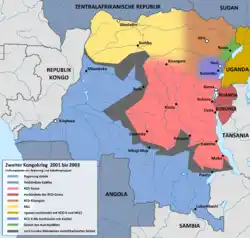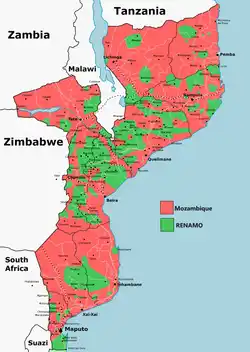
Sub-Saharan emigration to South Africa refers to the process whereby people from other Sub-Saharan African countries have migrated to South Africa during the twentieth and early twenty-first centuries. South Africa is one of the continent’s largest and wealthiest nations, factors which have driven migration from other Sub-Saharan countries to Africa’s most southerly nation. Between the 1960s and 1980s much of this migration consisted of white colonial populations arriving to Apartheid South Africa from countries like Rhodesia/Zimbabwe where black-majority rule was being established. Since the end of Apartheid the nature of Sub-Saharan migration to South Africa has changed and today many people come here from countries like Mozambique, Malawi, Namibia, Ethiopia and the Congo region in search of economic opportunity and a more stable political environment. Between the mid-1970s and the mid-2000s a huge part of this emigration was fuelled by Sub-Saharan conflicts and crises like the Ethiopian Civil War, the Somali Civil War, the Rwandan genocide, the First and Second Congo Wars, the Bush War in Rhodesia/Zimbabwe and the civil wars in Angola and Mozambique.[1]
Research your ancestors on MyHeritage
Sub-Saharan emigration to South Africa chronology of eventsSub-Saharan emigration to South Africa chronology of events
South Africa is the sixth most populous country in Africa. Only Nigeria, Ethiopia, Egypt, the Democratic Republic of the Congo and Tanzania have larger populations, while it is also a large country with a more habitable climate than many other parts of the continent. Moreover, because of its natural resources, location at the southern extremity of Africa and many ports and large cities, people have been drawn here over the centuries. In recent decades, particularly so since the wave of decolonization which occurred in Africa between the late 1950s and mid-1970s, emigration from Sub-Saharan Africa to South Africa has accelerated. While Apartheid was officially in place between 1948 and 1994 South Africa drew lots of white migrants from other African countries like Rhodesia/Zimbabwe and Kenya, while since the ending of white minority rule the country has become more attractive to black people from Sub-Saharan Africa.[2]

Many factors account for Sub-Saharan migration to South Africa. Between the 1960s and 1980s, as colonial rule ended in many other African countries, white colonial people often migrated to South Africa, which they viewed as a bastion of old colonial rule under the Apartheid regime. Many Rhodesians from modern-day Zimbabwe, in particular, moved south from Rhodesia into South Africa towards the end of the long-running Bush War there in the 1960s and 1970s and the eventual establishment of black-majority rule in Zimbabwe in the 1980s.[3]
The period from the mid-1970s also witnessed an increasing number of civil wars, genocides and other conflicts in Sub-Saharan Africa which led to mass emigration from the nations in turmoil. Many of the emigrants involved settled in South Africa. For instance, the sudden end of Portuguese colonial rule in Angola and Mozambique following the Carnation Revolution of 1974 led to lengthy civil wars in both countries between the mid-1970s and the 1990s, continuing in Angola until 2002. Both countries are located near South Africa, while Mozambique shares a lengthy border with it. As such, these civil wars created emigration from these former Portuguese colonies, much of it towards South Africa.[4]
The same processes occurred in the Horn of Africa from the late 1970s. Here Ethiopia descended into a long-running civil war from 1974. This led to a major famine in the 1980s and subsequently wars with Eritrea. At the same time Somalia descended into a long-running civil war from the end of 1980s.[5] Further south, the Great Lakes refugee crisis began in the mid-1990s as a result of the Rwandan Civil War and genocide. The First and Second Congo Wars followed. All of this geopolitical instability in the Horn of Africa, the African Great Lakes region and southern Africa more broadly created the circumstances for mass Sub-Saharan emigration to South Africa since the mid-1970s.[6]
More significantly, while it might have many problems today, including high crime levels and endemic official corruption, South Africa is the wealthiest nation in Africa according to numerous metrics.[7] For instance, it has one of the highest GDPs of any country on the continent, eclipsed by only a small number of oil-rich countries like Equatorial Guinea wherein there are extremely high levels of income disparity associated with corrupt petro-dictatorships. Income is spread more evenly in South Africa. Its per capita GDP eclipses other large African nations like Nigeria, Ethiopia and Egypt.[8] As a result, while there are fewer major civil wars and genocides driving people from Sub-Saharan countries like Somalia, Rwanda and the Congo to South Africa today, there are more economic migrants arriving to South Africa.
Extent of Sub-Saharan emigration to South AfricaExtent of Sub-Saharan emigration to South Africa

Sub-Saharan emigration to South Africa and the scale of it varies greatly from region to region. The scale of migration from West Africa south of the Sahara Desert, for instance, has been limited. Where people have moved from countries like Mali or Niger in the Sahel, for example, owing to desertification or political instability in modern times, they have tended to migrate to other West African nations or to head north towards the Mediterranean and onwards to Europe. Therefore Sub-Saharan emigration to South Africa has disproportionately come from countries in the Horn of Africa or the region from the Congo and African Great Lakes south. In general the larger waves of such emigration have occurred as a result of wars and instability. There was, for instance, a particularly large surge in Congolese migrants to South Africa between 2000 and 2015. During this time the number of Congolese migrants living in South Africa grew from just over 8,000 to more than 70,000.[9]
The example of Mozambique is a germane one. At the height of the civil war here in the 1980s, it is estimated that between 250,000 and 350,000 Mozambicans fled over the southern border of the country into South Africa.[10] Similarly, tens of thousands of White Rhodesians migrated to South Africa at the end of the Bush War and in the first decade or so of black majority rule in Zimbabwe. Other groups such as Rwandans, Congolese and Somalis migrated in sizeable enough numbers to South Africa between the late 1980s and the mid-2000s owing to the Rwandan Civil War and genocide, the Congo Wars and the Somali Civil War.
Demographic impact of Sub-Saharan emigration to South AfricaDemographic impact of Sub-Saharan emigration to South Africa

South Africa is one of the most ethnically diverse countries in Africa. Not all of this is owing to Sub-Saharan emigration to the country. For instance, the large white minority population is the result of waves of different kinds of European migration to southern Africa since the middle of the seventeenth century, first by Dutch, German and French Huguenot settlers (later known as the Boers), and then increasingly by British migrants in the nineteenth century.[11] British rule also brought a large number of Indian indentured servant settlers to places like Durban and the province of Natal in the late nineteenth and early twentieth centuries.[12]
Sub-Saharan migration has consequently only been one factor in the creation of the ethnically diverse demography of modern-day South Africa. It has resulted in, for instance, around 300,000 Mozambicans settling in South Africa in the 1980s, while a huge proportion of the white Rhodesian population moved to live in South Africa during and after the Bush War in what became Zimbabwe. Some groups, such as the Mozambicans, continue to arrive to this day owing to residual tensions in their respective countries. This means that even this modern-day Sub-Saharan emigration to South Africa has brought a very diverse range of people to the country, both black and white. In essence, Sub-Saharan migration to South Africa has added to the demographic complexity of the country.[13]
See alsoSee also
- South Africa
- Apartheid
- African surnames
- Scramble for Africa
- Rhodesian Bush War
- Carnation Revolution
- First Congo War
- Second Congo War
- Boko Haram insurgency
- Ethiopian Civil War
- Eritrean War of Independence
- Eritrean-Ethiopian War
- Somali Civil War
- Isaaq genocide
- Rwandan genocide
- European Union migration crisis
Explore more about Sub-Saharan emigration to South AfricaExplore more about Sub-Saharan emigration to South Africa
- South Africa, Dutch Reformed Church Registers, 1660-1970 records collection on MyHeritage
- South Africa, Methodist Parish Registers, 1822-1996 records collection on MyHeritage
- South Africa, Free State Dutch Reformed Church Records, 1848-1956 records collection on MyHeritage
- South Africa, Orange Free State, Estate Files, 1951-2006 records collection on MyHeritage
- South Africa Reckons with Its Status as a Top Immigration Destination at Migration Policy Institute
- Climate-fueled Violence and Displacement in the Lake Chad Basin at Refugees International
- Democratic Republic of the Congo: A Migration History Marked by Crises and Restrictions at Migration Policy Institute
- Severe Repression in Eritrea Has Prompted Decades of Exodus at Migration Policy Institute
- Migration and Migrants: Regional Dimensions and Developments at UN Migration
- Once Primarily an Origin for Refugees, Ethiopia Experiences Evolving Migration Patterns at Migration Policy Institute
- Understanding the patterns and causes of African migration at The Brookings Institute
References
- ↑ https://www.migrationpolicy.org/article/south-africa-immigration-destination-history
- ↑ https://www.migrationpolicy.org/article/south-africa-immigration-destination-history
- ↑ Alan Simon, ‘Rhodesian Immigrants in South Africa’, in African Affairs, Vol. 87, No. 346 (January, 1988), pp. 53–68.
- ↑ https://www.rfi.fr/en/africa/20240427-how-the-carnation-revolution-changed-the-fate-of-portuguese-colonies-in-africa
- ↑ https://lordslibrary.parliament.uk/ethiopia-conflict-and-food-insecurity-40-years-on-from-the-1984-famine/
- ↑ https://www.cfr.org/global-conflict-tracker/conflict/violence-democratic-republic-congo
- ↑ https://www.gov.za/anti-corruption
- ↑ https://www.statista.com/statistics/1121014/gdp-per-capita-of-african-countries/
- ↑ https://www.migrationpolicy.org/article/democratic-republic-congo-migration-history-marked-crises-and-restrictions
- ↑ Chris Dolan, ‘Aliens Abroad: Mozambicans in the New South Africa’, in Indicator South Africa, Vol. 12, No. 3 (Winter, 1995), pp. 29–32.
- ↑ Leonard Guelke, ‘The Anatomy of a Colonial Settler Population: Cape Colony 1657–1750’, in The International Journal of African Historical Studies, Vol. 21, No. 3 (1988), pp. 453–473.
- ↑ http://www.sahistory.org.za/article/indian-indentured-labour-natal-1860-1911
- ↑ Jonny Steinberg, A Mixed Reception: Mozambican and Congolese Refugees in South Africa (Pretoria, 2005).

